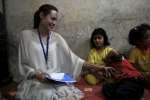- Text size
 |
|  |
|  |
| 
- عربي
Hands Across the Water: Brazil's large Syrian community absorbs refugees
News Stories, 6 August 2013
SAO PAULO, Brazil, Aug 6 (UNHCR) – When Syrian businessman Nidal Hassan flew to Sao Paulo a year ago it was not his first visit to Brazil, but this time he was looking for shelter and a new start rather than business opportunities.
"We didn't have a choice because our situation in Syria became unsustainable," said the 53-year-old from the city of Homs, which has been devastated by heavy fighting between government and rebels forces since the Syria crisis erupted in March 2011.
He said that before they left Homs, people had begun searching for food under the rubble of destroyed buildings and, "We ran out of gas and drinking water." Nidal said he had decided to leave because they were risking their lives by staying, but his older daughter stayed behind with her husband and children.
But instead of seeking shelter in Lebanon, Turkey, Iraq, Jordan or Egypt, which together have taken in 1.89 million Syrians, Nidal decided to head across the Atlantic to Brazil, which has a big Syrian community. He was not the only one; Brazil has granted asylum to just over 200 Syrian refugees in the past two-and-a-half years and a further 50 claims are waiting to be processed. In April, the number of asylum-seekers recognized was up 50 per cent on the month before.
The Brazilian government has approved 100 per cent of the asylum claims presented so far by Syrian nationals, but many more people may have flown to the country and not bothered to seek asylum.
"We assume that the number of Syrians living in Brazil because of the conflict is much bigger than the figure revealed by the official statistics," said Andrés Ramirez, UNHCR's representative in Brazil. He said that this was because many of the new arrivals were staying with family or friends among the estimated 3 million-strong Syrian community, which is playing a key support role.
Syrian asylum-seekers had started arriving in Brazil from the very beginning of the conflict and officials said this was this was due to the strong historical links between the two countries and the big Syrian community.
Most of the asylum-seekers have presented their claims in Sao Paulo, which hosts the largest Syrian community, but they have also approached the authorities in other cities and states where Syrians are settled, including the Federal District, Southern Santa Catarina and Rio Grande do Sul.
But the government and several humanitarian organizations, such as UNHCR implementing partner Caritas Sao Paulo as well as the Syrian Orthodox Church, provide needy refugees and asylum seekers with aid, including psycho-social assistance, emergence financial grants and Portuguese-language classes to ease their integration.
The government provides them with the documentation needed to access public services, such as education and health, and to find employment, rent a place to stay and open a bank account. The most vulnerable cases receive extra support.
"With the Portuguese language classes, I am trying to minimize my dependence on other people and improve my chances of finding a job," said Ali Humsi, who arrived in Brazil from Syria with his family more than a year ago.
His experience reflects the integration challenges that most of the Syrians face in Brazil due to cultural differences, including those who are highly trained. Kamal Abogavar was an IT expert back in Syria, but he now works as a sales assistant in a central Sao Paulo clothes store owned by a fellow Syrian.
Within the Syrian community, businessman Amer Masarani coordinates a support group in Sao Paulo that began as a Facebook page. He has been living in Brazil for the last 15 years and through his local network, Masarani, raises money to pay the rent for people arriving from Syria. He has also helped some refugees get jobs with Syrian-owned companies in Sao Paulo.
In another neighbourhood, Father Gabriel Dahho mobilizes the members of the Syrian Orthodox Church to collect cloths and money for the refugees. He also offers Portuguese classes and jobs. Father Gabriel has relatives exiled in Germany and works in close coordination with Caritas to help refugees, with funding from UNHCR and the Brazilian government.
"UNHCR considers that the vast majority of Syrian nationals leaving their country under the current circumstances are in need of international protection," the refugee agency's Ramirez stressed. "We are glad to see Brazil keeping its borders open and processing asylum claims in a timely manner.
According to official figures, Brazil hosts around 4,300 recognized refugees from more than 70 different nationalities. The main groups are from Angola, Colombia and Democratic Republic of the Congo. The country has recently adopted a cessation of refugee status clause for Angolans and Liberians, and as soon as those individuals receive a permanent visa, Syrians will represent the third biggest group of recognized refugees living in Brazil.
By Karin Fusaro and Luiz Fernando Godinho in Sao Paulo, Brazil






















